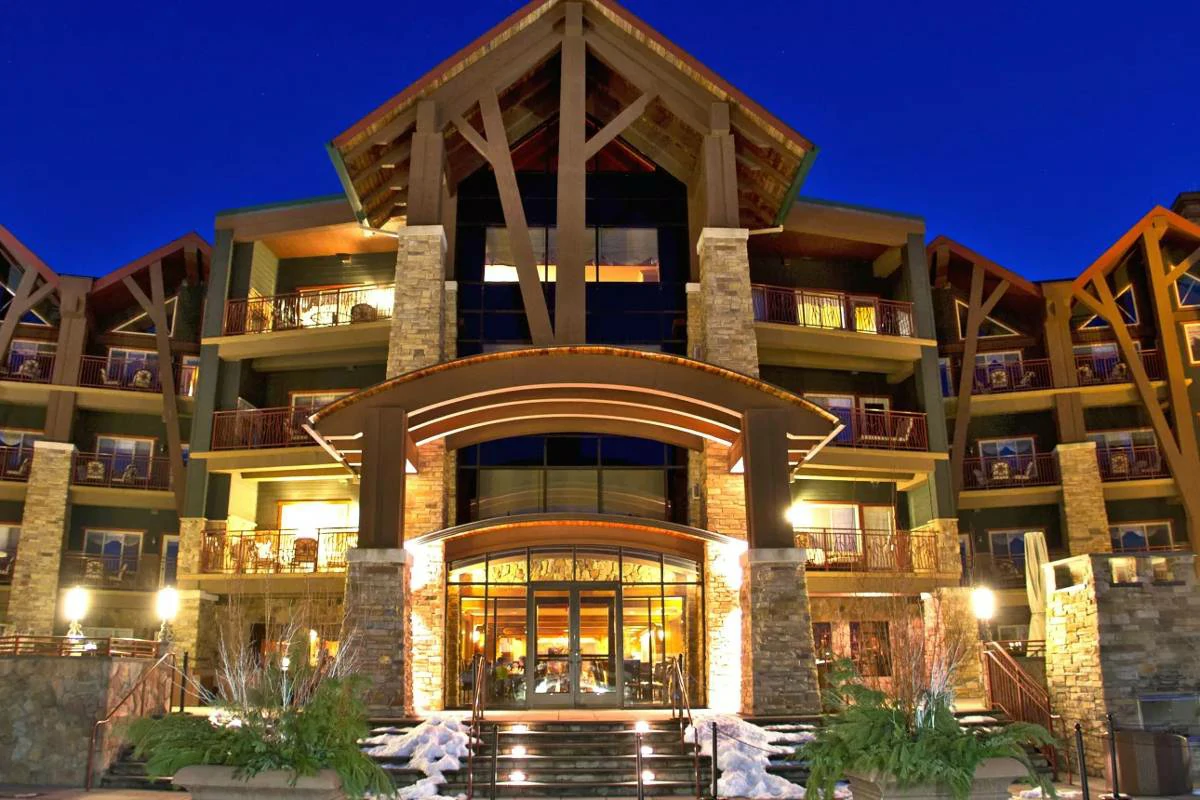What’s the difference between a hotel and a motel? Answer is – Motels and hotels both offer lodging, but there are key distinctions. Motels are generally smaller, roadside establishments designed for short overnight stays by motorists, with rooms directly accessible from the parking lot. Hotels are often larger, more centrally located, and cater to a wider range of travelers. Hotels usually offer more amenities like restaurants, pools, gyms, and concierge services.
Summary
- Motels are designed for short-term stays by road travelers.
- Hotels cater to a wider range of guests with longer-term options.
- Motels typically have exterior room access and limited amenities.
- Hotels often have interior corridors, restaurants, pools, and other services.
- Motels are generally more budget-friendly.
What’s the Difference Between a Hotel and a Motel?

Whether you’re planning a cross-country road trip, a weekend getaway, or a business conference, choosing the right accommodation is essential for a comfortable and enjoyable travel experience. Two of the most common options are hotels and motels.
While both offer a place to rest your head, there are important distinctions between them that can impact your stay. Let’s explore those differences.
What are Hotels and Motels?
Hotels are establishments that provide lodging and, often, a wide range of amenities and services to guests. They come in various shapes and sizes, catering to diverse needs and budgets – from luxury resorts to budget-friendly chains.
Motels, on the other hand, are a contraction of “motor hotel.” They are designed primarily for motorists, typically located along highways, and offer basic accommodations and convenient parking.
Why Understanding the Differences Matters
As a traveler, understanding the differences between hotels and motels allows you to make informed decisions about where to stay. Here’s why it’s important:
Meeting Your Needs: If you’re looking for a place to crash for the night during a road trip, a motel might be perfectly sufficient. However, if you need extra amenities, like a gym or a restaurant, a hotel would be a better fit.
Budget Considerations: Motels are generally more affordable than hotels, making them an attractive option for budget-conscious travelers.
Comfort and Convenience: The level of comfort and convenience offered by hotels and motels can vary. Consider your priorities to determine the best fit for your travel style.
Sarah Peterson Expert Opinion
“Understanding the nuances between hotels and motels empowers travelers to choose accommodations that align with their specific needs and preferences,” says Sarah Peterson, a seasoned travel blogger and hospitality consultant.
What is a Hotel?

A hotel is a commercial establishment that provides paid lodging on a short-term basis. Hotels offer a variety of room types and often provide a range of amenities and services designed to enhance the guest experience.
1. Typical characteristics
Size: Hotels vary widely in size, from small boutique hotels with just a few rooms to sprawling resorts with hundreds or even thousands of rooms.
Location: Hotels can be found in a variety of locations. Urban hotels are often situated in bustling city centers, offering easy access to attractions, restaurants, and business districts. Resort hotels might be located in scenic destinations near beaches, mountains, or national parks. Airport hotels provide convenient accommodations for travelers with early flights or layovers.
Amenities: The amenities offered by hotels can significantly impact the guest experience. Common amenities include:
- Restaurants and Bars: These range from casual cafes to fine-dining establishments.
- Pools and Spas: Ideal for relaxation and leisure.
- Fitness Centers: Allow guests to maintain their exercise routines.
- Meeting and Conference Rooms: Often used for business events and social gatherings.
- Concierge Services: Provide assistance with booking tours, making reservations, and offering local recommendations.
2. Types of travelers hotels cater to
Hotels cater to a diverse clientele, making them suitable for various travel needs:
Business travelers: Hotels often offer business centers, high-speed internet, and meeting spaces, making them ideal for those traveling for work.
Leisure travelers: With their extensive amenities and comfortable accommodations, hotels are a popular choice for families, couples, and solo travelers seeking relaxation and exploration.
Group travelers: Many hotels provide ample meeting spaces and group room rates, making them suitable for weddings, conferences, and sports teams.
James Wilson Expert Opinion
“Hotels have evolved to become more than just places to sleep. They are destinations in themselves, offering a curated experience tailored to the modern traveler,” notes James Wilson, a hospitality industry analyst with over 20 years of experience .
What is a Motel?

A motel, a portmanteau of “motor” and “hotel,” is a roadside establishment designed specifically for motorists. Motels generally offer basic overnight accommodations with convenient parking adjacent to the rooms.
1. The origin of the word “motel”
The term “motel” first emerged in 1925 with the opening of the Milestone Mo-Tel in San Luis Obispo, California.
The owner, Arthur Heineman, coined the term to reflect the establishment’s focus on providing convenient lodging for travelers arriving by automobile.
2. Typical characteristics
Size: Motels are typically smaller than hotels, often with one or two stories and a limited number of rooms.
Layout: The classic motel layout features a linear or U-shaped structure with rooms facing a central parking area. Guest rooms are usually accessed directly from the outside, offering easy unloading and loading of vehicles.
Parking: One of the defining features of a motel is the ample parking directly in front of or very near the rooms. This allows for ultimate convenience for road-weary travelers.
3. Types of travelers motels cater to
Motels are a popular choice for several types of travelers:
Road trippers: Motels are synonymous with road trips, providing a no-frills place to rest during long journeys.
Budget travelers: Motels are generally more affordable than hotels, making them a popular choice for those traveling on a budget.
Travelers seeking convenience: Motels offer quick check-in and easy access to rooms, ideal for travelers who simply need a place to sleep before hitting the road again.
Overnight stays: Motels are well-suited for those needing a short overnight stay while in transit to their final destination.
Emily Thomas Expert Opinion
“Motels hold a nostalgic place in American travel culture, representing a simpler era of road trips and roadside attractions,” remarks Emily Thomas, a travel historian specializing in roadside Americana.
Key Differences Between Hotels and Motels

| Feature | Hotels | Motels |
|---|---|---|
| Size & Structure | Diverse sizes, from boutique to mega-resorts | Smaller, typically 1-2 stories |
| Interior corridors, multiple floors | Exterior room access, linear or U-shaped layout | |
| Location | Urban, suburban, resort destinations | Primarily along highways and roadsides |
| Target Audience | Business travelers, leisure travelers, families, groups | Road trippers, budget travelers, overnight stays |
| Amenities | Wide range: restaurants, pools, gyms, spas, etc. | Limited: basic breakfast, vending machines |
| Cost | Varies widely, from budget to luxury | Generally more affordable |
1. Size and Structure
Hotel size variations: Hotels exhibit significant variation in size. You’ll find small boutique hotels with a personal touch alongside sprawling mega-resorts offering a seemingly endless array of facilities.
Motel layouts and room access: Motels traditionally adhere to a more standardized structure. They are frequently one or two stories tall with rooms arranged in a linear or U-shape around a parking lot. Guests typically enter their rooms directly from the outside.
2. Location
Hotel locations (urban vs. suburban): Hotels enjoy diverse locations. Urban hotels offer proximity to a city’s buzz, while suburban hotels might provide a quieter setting with easy access to highways. Resort hotels are often found in idyllic locations near beaches, mountains, or other leisure destinations.
Motel locations (highways and roadsides): The classic motel is synonymous with highways and roadsides. Their strategic location offers a convenient stopover for motorists traveling long distances.
3. Target Audience
Types of travelers hotels attract: Hotels cater to a wide spectrum of travelers. Business travelers appreciate their meeting facilities and work-friendly amenities. Leisure travelers are drawn to their pools, spas, and diverse dining options. Families and groups find value in hotels offering connecting rooms and organized activities.
Types of travelers motels attract: Motels are a haven for road trippers seeking a no-frills place to rest for the night. Budget-conscious travelers appreciate their affordability. Those needing a quick overnight stay between destinations find motels perfectly suitable for their needs.
4. Amenities and Services
Extensive hotel offerings: Hotels often boast a wide range of amenities designed to enhance the guest experience. These may include restaurants, bars, swimming pools, fitness centers, spas, business centers, concierge services, and more.
Limited motel offerings: Motels generally provide the essentials. While some offer basic breakfast options or vending machines, their focus remains on providing a clean, comfortable room and convenient parking.
5. Cost
Price ranges for hotels: Hotel prices vary greatly depending on factors like location, amenities, brand reputation, and seasonality. You’ll find everything from budget-friendly chain hotels to ultra-luxurious five-star establishments.
Budget-friendly motels: Motels are known for their affordability. While they lack the extensive services of hotels, they offer a cost-effective solution for travelers prioritizing a place to sleep over extra amenities.
Michael Harrison Expert Opinion
“When choosing between a hotel and a motel, it’s crucial to consider your travel priorities. If you need amenities, a central location, and are willing to pay more, a hotel is likely the way to go. If convenience, budget, and a simple overnight stay are your focus, a motel ticks the boxes,” advises Michael Harrison, a travel blogger and hospitality consultant
When to Choose a Hotel

Hotels are the optimal choice in several travel scenarios:
Business Trips: Hotels cater to the needs of business travelers. Amenities like meeting spaces, business centers, reliable Wi-Fi, and in some cases, room service, make them ideal for conducting work away from the office.
Leisure Travel: If you prioritize comfort, relaxation, and a plethora of on-site activities, hotels are the way to go. Pools, spas, fitness centers, and diverse dining options enhance your leisure experience and keep you entertained without having to leave the property.
Family Vacations: Many hotels offer family-friendly features. Connecting rooms, kids’ clubs, supervised activities, and even on-site waterparks make them a hit with families of all sizes.
Special Occasions: Whether you’re celebrating a honeymoon, anniversary, or a milestone birthday, hotels can elevate your special occasion. Pamper yourself with spa treatments, indulge in gourmet cuisine, and enjoy luxurious amenities to create lasting memories.
Extended Stays: If your trip involves staying in one location for an extended period, a hotel could be more convenient. Some hotels offer suites with kitchenettes or long-term stay discounts, making them a comfortable and practical option.
Urban Exploration: When your focus is on exploring a city’s attractions, museums, and nightlife, a centrally located hotel provides easy access. You’ll save time and money on transportation, maximizing your enjoyment of the urban environment.
When to Choose a Motel
Motels shine in these specific travel situations:
Road Trips: The quintessential road trip experience often involves staying at motels. Their convenient highway locations and focus on the essentials allow you to get a good night’s rest and quickly hit the road again to continue your journey.
Budget Travel: If sticking to a strict budget is a priority, motels offer significant cost savings compared to hotels. This allows you to allocate more of your travel funds to experiences and activities at your destination.
Overnight Stops: When you simply need a place to sleep between destinations, a motel provides a clean, comfortable room without unnecessary extras that you won’t have time to utilize.
Last-Minute Bookings: It can be easier to find availability at motels, especially during peak seasons or when booking at the last minute. This makes them a reliable option when your travel plans are less structured.
Traveling with Pets: Some motels have pet-friendly policies, making them a convenient choice for travelers who don’t want to leave their furry companions behind.
Sarah Thompson Expert Opinion
“The best accommodation choice depends entirely on your individual needs and the nature of your trip. Don’t discount the simple convenience of a motel for certain travel styles, and luxuriate in a hotel’s amenities when it fits your goals,” suggests Sarah Thompson, a seasoned travel writer with over a decade of experience.
The Evolution of Motels and Hotels

1. How motels have changed over time
Early Days: The first motels were spartan affairs, offering little more than a bed, a bathroom, and a place to park. Their focus was purely on providing functional accommodation for weary motorists.
The Heyday: Motels experienced a golden age in the mid-20th century, coinciding with the boom in car ownership and the expansion of the American highway system. They became iconic symbols of roadside Americana, often featuring flashy neon signs and themed architecture.
Decline and Resurgence: With growing competition from chain hotels and the rise of air travel, the popularity of traditional motels declined. However, recent years have seen a resurgence of interest in motels, driven by nostalgia and a desire for unique, authentic travel experiences. Some motels have been revitalized with a retro-chic aesthetic or transformed into boutique accommodations with modern amenities.
2. Trends in the hotel industry
Technology Integration: Hotels are increasingly embracing technology to enhance the guest experience. From mobile check-in and keyless entry to smart rooms controlled by voice commands, technology is streamlining processes and personalizing stays.
Focus on Wellness: Recognizing the importance of wellbeing, many hotels now incorporate wellness elements into their offerings. Think state-of-the-art fitness centers, healthy dining options, in-room meditation programs, and luxurious spa experiences.
Experiential Travel: Hotels are evolving into more than just a place to sleep. They curate experiences for their guests. This could involve unique local partnerships, immersive cultural activities, or behind-the-scenes tours, offering travelers a deeper connection to their destination.
Sustainability: The hotel industry is becoming increasingly eco-conscious. Many hotels implement sustainable practices such as energy and water conservation, waste reduction, and utilizing locally sourced materials.
Mixed-use Developments: We’re seeing a rise in hotels integrated into larger mixed-use developments that may encompass residential units, retail spaces, and co-working facilities. This creates a dynamic community hub rather than a standalone accommodation.
Dr. Elizabeth Johnson Expert Opinion
“The hospitality industry is in a constant state of flux, responding to shifting traveler preferences and technological innovations. The most successful hotels and motels will be those that adapt and offer exceptional experiences that resonate with their guests,” observes Dr. Elizabeth Johnson, a professor of hospitality management with extensive industry research experience.
Pros and Cons: Hotels vs. Motels

| Feature | Hotels | Motels |
|---|---|---|
| Amenities | Pros: Extensive (pools, restaurants, etc.) Cons: Can add to the cost |
Pros: Focus on essentials Cons: Limited options for dining, leisure |
| Comfort & Luxury | Pros: Prioritize comfort, diverse room options Cons: Luxury comes at a premium |
Pros: Can find modern, updated motels Cons: Quality can be inconsistent |
| Location | Pros: Urban, resort, & suburban options Cons: Prime locations can be pricey |
Pros: Convenient highway access Cons: Fewer options in cities |
| Services | Pros: Concierge, room service, etc. Cons: May not be necessary for all travelers |
Pros: Simple check-in/out Cons: Lack of additional services |
| Cost | Pros: Range of budgets, including luxury Cons: Overall more expensive |
Pros: Significantly more affordable Cons: Sacrificing amenities for savings |
1. Hotels
Pros
Amenities: Hotels often boast a wide range of amenities, from restaurants and bars to pools, spas, and more. This makes them perfect for leisure and extended stays.
Comfort and Luxury: Hotels prioritize comfort, offering a choice of room types, high-quality linens, and potentially luxurious touches to enhance your stay.
Location: Hotels frequently have prime locations in urban centers or near major attractions, offering convenience for exploring cities or enjoying resort destinations.
Services: Concierge services, bellhops, room service, and 24-hour reception are some of the services many hotels provide, creating a hassle-free experience.
Rewards Programs: Many hotel chains offer rewards programs that can lead to free stays, upgrades, and exclusive perks for loyal customers.
Cons
Cost: Hotels tend to be more expensive than motels, particularly those offering extensive amenities and luxury experiences.
Less Personal: Large hotels can sometimes lack the personal touch and charm often found in smaller establishments or independently owned motels.
Parking Fees: Some hotels, particularly in urban locations, charge additional fees for parking, which can add to your overall costs.
2. Motels
Pros
Affordability: Motels are a budget-friendly option, allowing you to allocate more of your funds towards activities and experiences at your destination.
Convenience: Their strategic highway locations and easy exterior access make them ideal for quick stops and overnight stays during road trips.
Pet-Friendly: Many motels have pet-friendly policies, welcoming your furry companions along for the ride.
Nostalgia: Retro motels with their vintage charm offer a unique travel experience steeped in Americana.
Cons
Limited Amenities: Motels typically focus on providing the essentials, so don’t expect on-site restaurants, pools, or other leisure facilities.
Noise: Room layouts with exterior access can sometimes lead to increased noise levels compared to hotels with interior corridors.
Inconsistency: The quality and upkeep of motels can vary more than chain hotels, which often adhere to standardized brand expectations.
Brian Walker Expert Opinion
“Both hotels and motels have their merits, the best choice depends on your travel priorities and budget. Consider the trade-offs between amenities and cost to make a decision that aligns with your needs,” advises Brian Walker, travel industry consultant and former hotel manager.
Conclusion
Choosing between a hotel and a motel is ultimately a matter of aligning your travel priorities with what each type of accommodation offers. There’s no single “best” option, as it depends entirely on your needs, budget, and travel style.
Consider these factors when making your decision:
- Purpose of your trip: Is it business, leisure, a road trip, or simply a quick overnight stop?
- Amenities: Do you desire an array of amenities or are the basics sufficient?
- Location: Do you want convenient highway access or a central location for urban exploration?
- Budget: How important is affordability, and are you willing to pay more for extra services and comfort?
By weighing these factors, you can choose the lodging that will enhance your travel experience rather than hinder it. Remember, sometimes a cozy motel can be surprisingly charming, and other times, the luxurious amenities of a hotel are just what you need.
FAQs
Q: Are motels safe?
Like hotels, motel safety varies. Choose well-lit motels with positive reviews and security measures in place. Trust your instincts – if something feels amiss, seek alternative lodging.
Q: Can I find modern motels?
Absolutely! Many motels have undergone renovations, offering updated rooms, stylish décor, and even boutique-style experiences while retaining their core affordability and convenience.
Q: Do hotels offer discounts or deals?
Yes! Check hotel websites for direct booking deals, sign up for loyalty programs, and consider traveling in the off-season. Package deals that include flights and hotels can sometimes offer substantial savings.
Q: Are motels always cheaper than hotels?
Generally, yes, but it’s not a hard-and-fast rule. Budget hotel chains and off-season rates can sometimes be comparable to motel prices. Always compare options for the specific dates and locations of your trip.







